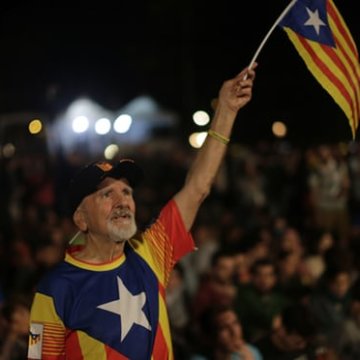- About
- Topics
- Picks
- Audio
- Story
- In-Depth
- Opinion
- News
- Donate
- Signup for our newsletterOur Editors' Best Picks.Send
Read, Debate: Engage.
| located: | Spain |
|---|---|
| editor: | Gurmeet Singh |
Catalan officials have claimed that preliminary results of its referendum have shown 90% in favour of independence in a vote vehemently opposed by Spain.
Declared illegal by the Spanish government, police were deployed to prevent people from voting. In many areas police violently broke up groups of voters, forcibly removing them from polling stations or queues, using rubber bullets and other weapons. Over 800 civilians were injured by police.
Jordi Turull, the Catalan Government spokesperson said that of the roughly 2.5 million people that voted, 90% of votes opted for Catalan independence. The ballots did not include those confiscated by police.
The scenes shocked the world. We're used to seeing (mostly) peaceful elections. We're used to disruptions being limited to developing nations; we're used to seeing racially charged disruptions in American elections. Spain's crackdown on the right of people to vote (albeit in an illegal election) demonstrates the often forgotten fact that even now, in our settled democracies in the Global North, unless the State verifies citizens' rights to vote, it will not allow it. In other words, behind the veil of words, lies state violence, always prepared to do what it must to secure what it wants.
Citizens have a right to vote. Yet non-citizens, people who reside and contribute to their areas should also be allowed to vote. That's my opinion, but this view is also increasingly gaining traction across democracies: the idea that citizenship is a political quality or essence claimed by individuals through action and demonstration. Catalan citizens want full independence from Spain, and have demonstrated their right to do so. Rajoy's government may react with violence, and the EU may react with criticism for the vote, but it is the peoples' right to vote, to claim who they want to be and to make their own futures a reality.
